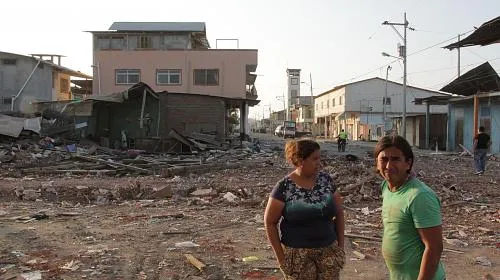QUITO (April 21, 2016) — After a powerful earthquake hit Ecuador on Saturday, CARE International is supporting affected survivors with water, emergency shelter and disease prevention. With thousands now in temporary shelters during the strongest El Niño on record, there is an increasing risk of water and mosquito borne disease outbreaks, like Zika Virus and Dengue Fever.
“Several days of heavy rains could have hindered search and rescue efforts leaving many of the deceased still under rubble. This greatly increases the risk of contaminated water and illnesses, such as Zika Virus, as many people are sleeping out in the streets,” said Fernando Unda, CARE Country Director in Ecuador. “It is critical that interventions are made to prevent these disease outbreaks, so our teams will be focusing on disease prevention as they also distribute water purification tablets and provide temporary water tanks.”
The 7.8-magnitude earthquake is one of the strongest the country has ever experienced and aftershocks are still being felt. “Clean water is one of the biggest needs. People have made signs everywhere asking for water, “ said Lucy Harman, CARE Emergency Team Leader from Jama, one of the areas most impacted. “It’s like a ghost town here. Everything is destroyed, so everyone is sleeping outside the town in makeshift shelters and the smell of death permeates the air.”
In addition to clean water and disease prevention, over the coming days, CARE will be in the remote areas hardest hit by the earthquake providing temporary shelter materials and helping with rubble removal.
CARE has been working in Ecuador for over 50 years. CARE’s programs have focused on helping poor communities through health and sanitation, education, forestry and women’s empowerment programs. CARE’s past work in Ecuador has included an emergency response to severe floods in 2008.
-END-
Media contacts
Holly Frew (USA), hfrew@care.org; +1 770-842-6188
About CARE
Founded in 1945, CARE is a leading humanitarian organization fighting global poverty. CARE has more than six decades of experience helping people prepare for disasters, providing lifesaving assistance when a crisis hits, and helping communities recover after the emergency has passed. CARE places special focus on women and children, who are often disproportionately affected by disasters. To learn more, visit www.care.org.

